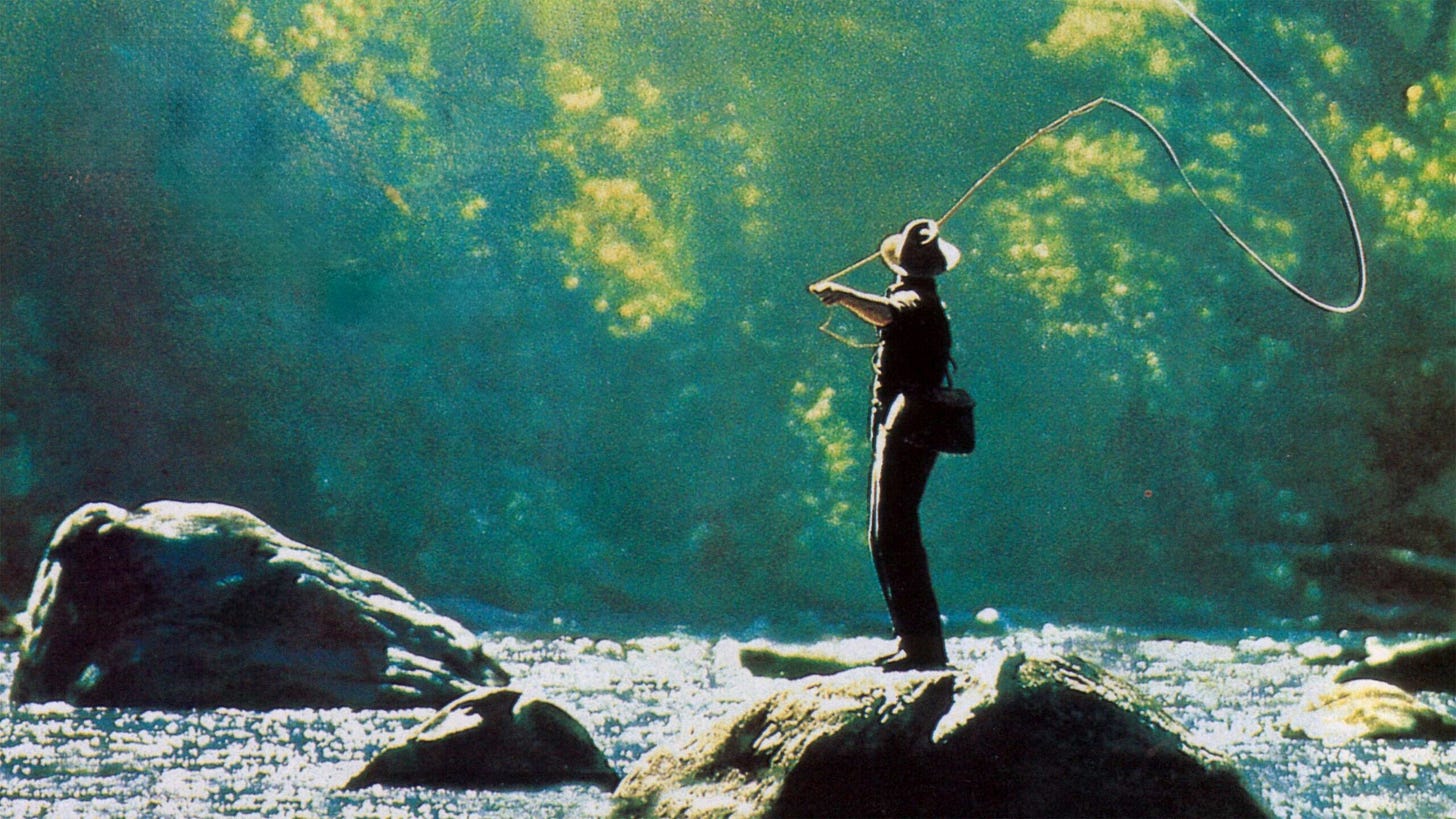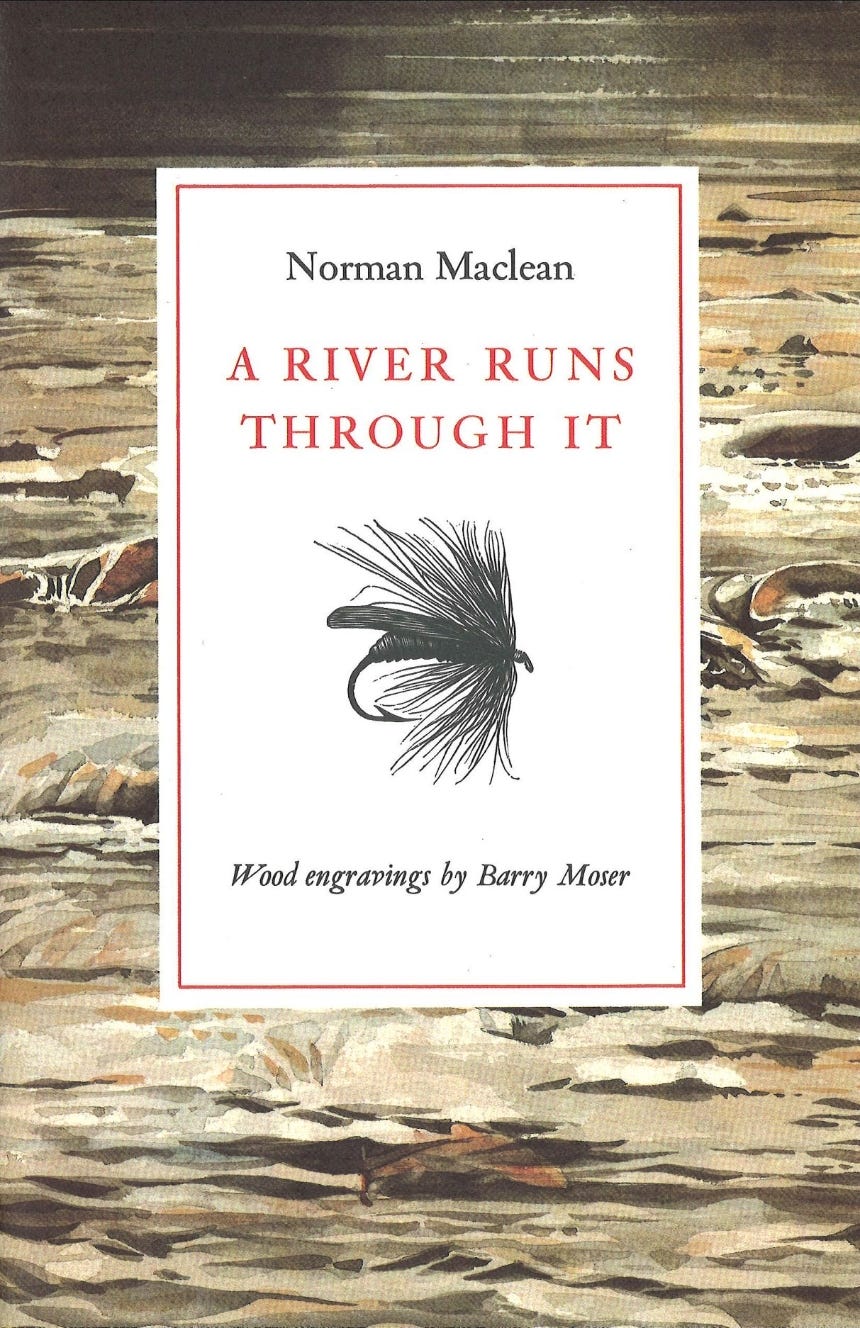Scott Samuelson: How Can I Help?
We need real help with the quandaries we have about helping others. Norman Maclean's timeless novella, A River Runs Through It, gives us a hand.

By Scott Samuelson
When it comes to the subject of help, contemporary philosophy is rarely helpful. Its discussions tend to revolve around things like if it’s morally acceptable to buy a cappuccino when children are starving somewhere, or what percentage of your income you’re entitled to keep, or (I’m not kidding) how much donating money harms you and the extent to which that harm should be balanced against the help you’re obliged to maximize. If you’re the kind of person who thinks that moral reasoning is an extension of balancing your checkbook, a rich literature awaits.
Floating in the background of these discussions is the idea that our current economic system is unjust. A lot of people agree with that. I agree with that. But I have my doubts that the best way to help the situation involves composing a scathing piece of theoretical Marxism, much less publishing a journal article for your career advancement that scolds its readers for having spent some of their graduate-school stipend at Starbucks.
We need real help with the quandaries we have about help. As far as politics goes, we wonder about what we can do to improve the situation and worry about if the backlash to our efforts will render them counterproductive. Even more often, we wonder about how to help the people we care about. When should I let things play out? When do I intervene? What can I even do? How can I do it? Also, how can I get my partner to stop constantly trying to fix me? Wait, do I need help?
Sometimes a situation presents itself where help is needed and help is wanted and help would clear up the problem and you know what’s needed and you have what’s needed and you’re in a position to give it. The norm is usually more complicated.
Let’s say you have a brother. His swagger has always made him the favorite of your parents and people in general. You’ve been going fishing with him since you were little kids. You’re a little jealous of how talented a fisherman he is. He loves you. You love him. He has your back. You have his back. For instance, you’ve had to bail him out of jail recently after a bad brawl. That’s not surprising. He’s tough, and he doesn’t take shit. And he drinks a lot. But his drinking doesn’t keep him from excelling at his job. And, let’s face it, you’re no teetotaler yourself. Rumor has it that he’s been gambling more than he should and getting mixed up with nasty characters. He also just did you a solid when you had to spend time with your asshole brother-in-law. Should you try to help your brother? Can you help him? How? What does he need? What does he need from you?
As some of you might have guessed, the situation I’m describing is the dilemma of Norman Maclean’s semi-autobiographical novella A River Runs Through It, which is a far more helpful—and ultimately tragic—reflection on the nature of help than any other text I can think of.
The two brothers are Norman (the narrator) and Paul (the graceful fly-fisherman). Right after Paul has done Norman that solid with the asshole brother-in-law, they go home to see their folks. They all have a meal together. It’s assumed that the brothers will head off to bed to get an early start for next morning’s fly fishing. But Paul suspiciously announces that he’s going to “run over town and see some old pals.” His father and brother are left to talk about if and how they should help him.
The father begins with a distinction: “By help I don’t mean a courtesy like serving chokecherry jelly or giving money.” (The mother has just served Paul homemade jelly. As for the money comment, it’s unclear if the father knows something about Paul’s gambling problem.) “Help,” he says, “is giving part of yourself to somebody who comes to accept it willingly and needs it badly.” But he realizes just how hard it is to help anyone by that definition: “Either we don’t know what part to give or maybe we don’t like to give any part of ourselves. Then, more often than not, the part that is needed is not wanted. And even more often, we do not have the part that is needed. It is like the auto-supply shop over town where they always say, ‘Sorry, we are just out of that part.’”
Norman argues back that help “doesn’t have to be anything that big.” Chokecherry jelly on a warm roll can indeed be helpful.
There’s more wisdom loaded into their exchange than can be mined from a library shelf of academic philosophy on the subject.
Then the father asks the million-dollar question: “Do you think you help him?” To which Norman replies, “My trouble is I don’t know him. In fact, one of my troubles is that I don’t even know whether he needs help. I don’t know, that’s my trouble.” Heartbreaking. The fraught discussion concludes with the father saying, “Tomorrow we will go fishing with him.”

Earlier in A River Runs Through It, Norman is talking with his wife about her needy asshole brother. At one point she frets, “Will you try to help me help him?” Her question implies a great point. A good marriage is sometimes about helping each other help. It’s a reminder of the richness of that old Biblical term for a spouse: helpmate.
But she goes on to wonder if helping is even helpful: “Tell me, why is that people who want help do better without it—at least, no worse. Actually, that’s what it is, no worse. They take all the help they can get, and are just the same as they always have been.” It turns out that help often leaves the needy the same as they were to begin with. It’s a lot like contemporary philosophy.
Sometimes our help is unwanted because the person is in denial. But often our help is unwanted because it’s a power trip on our part. There’s a talk by Anne Lamott where she makes the sharp observation, “Help is the sunny side of control.” She gets rightfully worked up about it: “Stop helping so much! Don’t get your help and goodness all over everybody!”
Hence the wisdom of how the father concludes the conversation: “Tomorrow we will go fishing with him.” Going fly fishing with Paul isn’t going to help him with his gambling problem. But what it does is more important than helping. It lays the groundwork for the possibility of help, for the possibility of finding the knowledge that Norman tragically lacks.
Even more importantly, fishing redeems the time they have together, regardless of whether help ever arrives.
As it turns out, that fishing trip is the last time they see Paul. Shortly thereafter, he’s murdered under mysterious circumstances, presumably because of the nasty characters he’s gotten wrapped up with.
The book ends with the famous lines about a river running through it and being haunted by waters. But right before the eerie ending, Norman tells of another conversation he had with his father in the wake of Paul’s death: “‘Do you think I could have helped him?’ he asked. Even if I might have thought longer, I would have made the same answer. ‘Do you think I could have helped him?’ I answered. We stood waiting in deference to each other. How can a question be answered that asks a lifetime of questions?”
Scott Samuelson holds a joint appointment at Iowa State University in Philosophy & Religious Studies and Extension & Outreach. He’s the author of three books: Rome as a Guide to the Good Life, Seven Ways of Looking at Pointless Suffering, and The Deepest Human Life—all published by the University of Chicago Press. His forthcoming book is The Angels of Bread: Lessons in Making Food and Being Human.

TFP IS A PROUD MEMBER OF THE IOWA WRITERS COLLABORATIVE



Constantly asking that question right now about our alcoholic daughter whose life is in shambles.